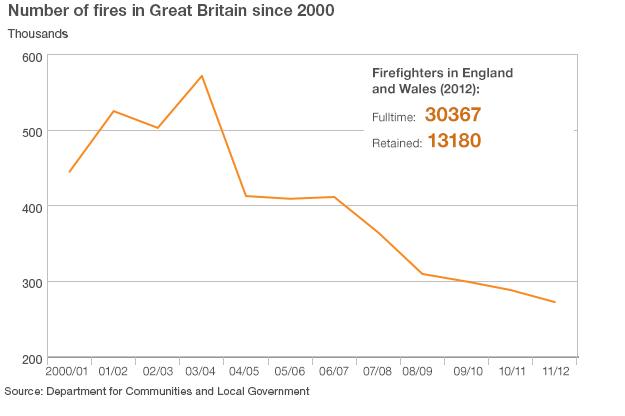Firefighters stage four-hour strike in pensions row
- Published
Fiona Trott at a picket line in Middlesbrough says firefighters are angry at the government's pension plans
Firefighters in England and Wales have staged a four-hour strike in a dispute over pensions.
The Fire Brigades Union (FBU) said it was a "warning shot" to government over plans to make members work up to 60.
Ministers said the action was unnecessary and called the pension offer "generous".
The FBU said 32,000 of its 41,000 members went on strike, which required fire services in England and Wales to make contingency plans.
The 46 local fire services in England and three in Wales ensured that 999 calls were answered as usual.
Firefighters in Scotland did not join the strike but could take action at a later date.
'Last resort'
The FBU said 32,000 of its 41,000 members took part in the strike. The members who did not strike had been either off duty or sick, the union said.
FBU general secretary Matt Wrack said the strike demonstrated his members' "anger and their determination".
Ian Hayton of Cleveland Fire Brigade says there is ''safety net cover'' in place
"This strike was a last resort after the government refused to negotiate - and a warning shot that firefighters are serious about keeping a fair, safe and workable pensions scheme," he said.
"Firefighters across the country are reporting a fantastic response from the public, who seem to understand that the government's proposals on pensions are ludicrous.
"We haven't ruled out further industrial action, but let's hope common sense wins out, public safety is put first and the government comes back open to compromise."
Contingency arrangements for the strike varied across the country. In some areas non-unionised fire crews stepped in and greater use was made of part-time and volunteer firefighters.
Private contractors were used by a handful of services, including in London and Surrey.
Fire Services Minister Brandon Lewis on the Fire Service strike: "We are very disappointed that the Fire Brigade Union have taken this course of action"
The armed forces had a back-up role and in the event of a major incident union members could have returned to work.
No major incidents were reported during the strike - which was the first national walkout for a decade.
London Fire Brigade received 84 999 calls and Emergency Fire Contingency Crews attended eight incidents. London Fire Commissioner Ron Dobson said he was "pleased" the contingency service had proved itself but said he hoped the dispute could be solved with no further industrial action
Firefighters who joined in with the strike in Surrey were told they would lose a full day's pay for their four hours of industrial action
West Midlands Fire Service received 34 calls during the four hours. Seven incidents required an attendance by non-striking West Midlands Fire Service personnel
Of the firefighters scheduled to work in Wiltshire, 120 were on duty and 128 went on strike. Wiltshire Fire and Rescue service say they were called to two incidents during the strike period
Devon and Somerset Fire Service received just five emergency calls during the four hours
'Completely unjust'
Steven, a firefighter from the north of England, told the BBC he was "reluctantly taking part" in the industrial action.
"Everyone has to work longer these days and I can see how it's unfair for us to retire earlier than other emergency workers," he said.
"However, if a person has worked as a firefighter for a long period of time, they aren't really able to do any other jobs."
Chris Smith, a retained firefighter from Hull did not go on strike.
"The incidents of fires are reducing as are accidents and the number of call-outs are reducing yearly, so it should not be as stressful or fitness demanding," he said.
"Our community comes first - we will not be striking."
The FBU claims many firefighters will not be fit enough to work to the retirement age of 60, and says they could lose thousands of pounds a year if they retire early.
Mr Wrack told BBC Radio 4 Today's programme the government's plans were unworkable as older firefighters were at risk of failing fitness tests.
Peter Wilcox of the Fire Brigades Union says there is ''increased risk'' in having a larger pool of older firefighters
"It is ludicrous to expect firefighters to fight fires and rescue families in their late-50s; the lives of the general public and firefighters themselves will be endangered," he said.
The government says the offer to firefighters is one of the "most generous in the public sector" and brings their pension age into line with the police and armed forces.
Brandon Lewis, fire minister for England, said prior to the strike: "Now that the Fire Brigades Union is pressing ahead with this unnecessary and avoidable strike, maintaining public safety is our first priority.
"I can reassure the public that all fire and rescue authorities in England and Wales have robust contingency plans in place.
"Incidents and call-outs are at an historical low - but in the event of a fire, the advice to people remains the same: 'Get out, stay out and call 999'; you will get an emergency response."

Labour leader Ed Miliband urged unions and the government to get "round the table" to resolve the conflict.
"What government should be doing is not ramping up the rhetoric but getting round the table with the firefighters to try and prevent this happening and sort it out," he told Sky News.
Update 3 October 2013: This story was originally published on 25 September. It was amended to include a link giving more background on the government's review of fire and rescue services in England.
- Published17 May 2013
- Published24 September 2013